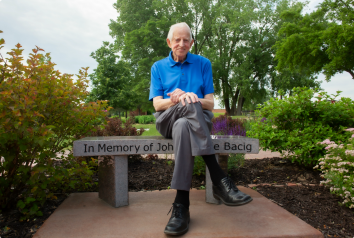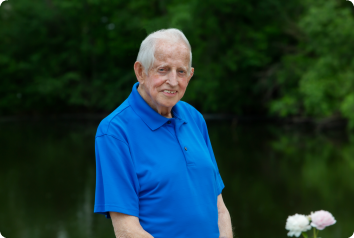 It seems appropriate that a man named Roger Toogood believes that life is filled with opportunities “to do good.” As executive director of Children’s Home for almost 30 years, Roger was a visionary who found himself at the right place and at the right time to make a difference in the arena he was most passionate about – improving children’s lives.
It seems appropriate that a man named Roger Toogood believes that life is filled with opportunities “to do good.” As executive director of Children’s Home for almost 30 years, Roger was a visionary who found himself at the right place and at the right time to make a difference in the arena he was most passionate about – improving children’s lives.
When he became the executive director of Children’s Home in 1969, Roger brought more than 10 years of experience in child welfare and a commitment to expanding our services beyond adoption. When he retired in 1996, his legacy fulfilling that commitment was deep and wide, thanks to programs that support the whole family – before, during and after adoption.
Today, more than 25 years after retirement, Roger is still revered for leading our organization through an era of great innovation and social change. He brought attention to social issues that affected families and developed programs to serve those impacted by abuse or unplanned pregnancy and a need for family counseling or daycare. He opened the door for thousands who wanted to grow their families through adoption but couldn’t because of social restrictions, becoming a pioneer in international adoption. He helped expand Minnesota’s child abuse reporting law to include social workers, doctors and teachers.
Asked what guided him to push forward with his trailblazing and often controversial efforts, Roger is both proud and humble. “Just common sense,” Roger said. “I didn’t come up with these ideas. I just happened to be the person in a position who could do something about them. So I did.”
Roger’s common-sense leadership keenly served Children’s Home for many years. The culture he established of adaptability and action still runs deep in the organization, but it wasn’t always so.
 Finding Opportunities to Do Good
Finding Opportunities to Do Good
When Roger first arrived at Children’s Home, he found a strong board of directors, a staff eager for positive leadership and an organization lacking direction. By his second year, he set in place long-range strategic planning and annual work plans to guide staff and board members to meet the changing needs of Minnesota communities.
“This was a new way of doing things,” Roger said, “and people were ready for it. My philosophy was to say, ‘We don’t have any problems – we only have opportunities to do good.”
It was the early 1970s and opportunities to do good were plentiful. Roger recognized how the emergence of the birth control pill and national abortion laws would undoubtedly affect the number of newborns available for adoption.
Children’s Home was already placing children with special needs, so it expanded those services. It partnered with the stat of Minnesota and nonprofit agencies to place children living in county foster homes, using a marketing campaign to “Make room in your heart and your home for one more.”
Soon, a local TV station sponsored “Thursday’s Child,” spotlighting children who were awaiting adoption. Within three years, 480 children – most of them older or with special needs – were placed with adoptive families.
Roger says this created a new challenge. “Now we had families wanting special-needs kids and there weren’t any ready for adoption in Minnesota!” Quickly realizing a new opportunity, Children’s Home developed the Midwest Adoption Facilitating Service, a consortium of agencies based in Minnesota that worked together to place children with special needs from Illinois, Iowa and Wisconsin.
Building on the successful model of partnering with family-focused organizations, it wasn’t long before connections with an international adoption agency in Korea – and specifically, the hiring of Mrs. Hyun Sook Han, who would become the driving force behind Children’s Home’s Korean adoption programs – revealed a new opportunity: international adoption.
The rest, as they say, is history: The Korean adoption program set the stage for a growing and evolving international adoption program that helped children from many countries find permanent and loving homes.
 A Painful Memory Leads to a Lifelong Passion
A Painful Memory Leads to a Lifelong Passion
Roger traces his passion for his work to a painful memory as a young adult. During his first year of college at the University of St. Thomas in Saint Paul, Minnesota, his mother, who struggled with alcoholism, committed suicide. One month later, his father died from cancer.
“The priests at the school were supportive and kind,” Roger said, “but during the whole situation, not a single person at St. Thomas or in my family or from my hometown reached out to me. I think it was because my mom died from suicide, and, back then, you just didn’t talk about that.”
In retrospect, Roger realizes that painful snub may have been a blessing. “It helped me see how important it is for people to listen and be sympathetic and show compassion. I can’t help but think that experience led me to social work because I knew the power of helping others.”
Roger believes he received another blessing early in life – meeting the woman who would become his wife of 63 years. “My dear wife, Marlys. My childhood sweetheart. I was fortunate.” Marlys died in 2019. Today, at 86, Roger is still active in his community. He’s the volunteer supervisor for his church’s prayer garden and he enjoys taking walks at a local park to visit the memorial bench placed in honor of Marlys for her service to the community. He treasures good books, good friends and his grown children who visit him regularly, bringing gifts of food and conversation.
He also values the time he spent at Children’s Home and continues to be a long-time donor. When Roger retired, the board of directors established the Toogood Endowment Fund for Children to honor the legacy of his years of service. Roger personally supports the Fund with regular contributions and is pleased to know the Fund will support the ongoing work of Children’s Home for years to come.
“I never saw my tenure at Children’s Home as a job,” said Roger. “It was a passion and a privilege.”


